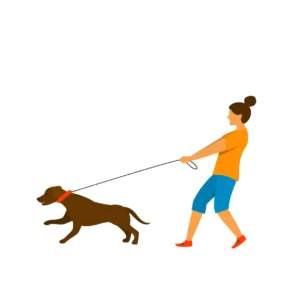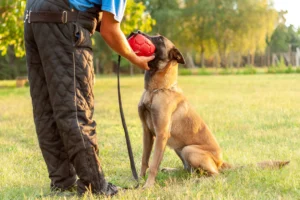Why Is My Dog Barking at Night? Common Causes and Effective Solutions

Sadly, there isn’t a single, definitive explanation for why dog barking at night. But there are a number of typical causes, the first of which is noise.
Dogs can hear far better than people. The same sound we hear can be heard four times farther by dogs.
Therefore, they will be listening for sounds that you won’t hear during the night, particularly if you live in a quiet rural area. So, why dog barking at night could be many reasons. Such as getting bored, lonely, or seeing strangers.
These noises are likely to make your dog bark at night, whether it’s a fox wandering through your garden, a bird building a nest in the trees, or someone walking home late at night.
If you live in a dog populated community, you might encounter group barking, which occurs when a dog hears another dog barking at night and begins to join in.
Dogs react and speak with one another by barking to alert potential intruders, which is why group barking happens. Hence in this guide, we aim to tell you why is my Dog barking at night.
General Causes of why dog barking at night
To begin with, how did your dog develop this annoying, sleep-depriving behavior? Dogs have many different reasons for barking and whining. These are the most frequent reasons Why is my Dog barking at night. These are as follows.
Disinterested or looking for attention
To notify the family that there is a disruption
Out of apprehension or anxiety
Feelings of loneliness or separation anxiety
Distress related to confinement when another dog or animal tries to get your attention, including annoyance at a change in routine because you unintentionally encouraged them to
1. Invest in a white noise generator
A white noise machine might be able to quiet your dogs barking if it is in reaction to other dogs or sounds.
White noise generators are also known to improve human sleep, so you both benefit from the product.
2. Give attention to enrichment and exercise
Both mental stimulation and physical exercise are equally important for putting your dog in a calm state of mind.
A play session, a walk at night, or a puzzle toy routine can help your dog let off steam.
Additionally, your dog releases endorphins when he chews on a lick mat, which can aid in relaxation.
3. Spend more time with your dog while you sleep.
Not forever. If you gave up on your dog completely, try starting over and leaving the room little by little.
Remember that while some dogs may benefit from a slower routine transition, this may not be the case for all of them.
Puppy crate training may require extra support for pups who have trouble sleeping through the night.
4. Ask your veterinarian about calming aids.
Discuss calming aids with your veterinarian if you’ve decided that your dog requires additional assistance outside of training.
Further, it has been demonstrated that the scent released by a DAP collar or soothing pheromone diffuser helps dogs unwind.

Dogs bark at night; why is that?
Compared to humans, dogs have far better hearing. Particularly if you live in a quiet rural area, dogs will be able to detect sounds that you won’t hear during the night because they can hear the same sound four times as far away.
Your dog may start barking at night if they hear something like a bird nesting in the trees, a resident fox wandering through your garden, or someone walking home late at night.
You might encounter group barking if you live in a dog-populated neighborhood. This occurs when a dog hears another dog barking at night and begins to join in.
Because dogs are pack animals, they react and communicate with one another by barking to alert other dogs to possible intruders. This is why group barking occurs.
But occasionally, dogs may just bark because they’re lonely or bored.
Are nighttime barking behaviors typical of puppies?
For new puppies, barking at night is quite common. They’ll be familiar with sleeping with their mother and siblings nearby, so the first few weeks in a new home can be a significant, frequently frightening, adjustment that causes anxiety and worry.
Get your dog familiarize with sleeping in a crate, even if it’s only for the first few months. This is the best training advice.
In addition to being a great place for your puppy to settle in while you train them, crates offer a secure, enclosed environment.
Set up the crate near your bed so your puppy can see you. This will allow you to hear them if they need to use the restroom at any time, which is inevitable during the first few weeks.
Why is my puppy barking randomly in the middle of the night?
When you first bring your puppy home, you might notice them barking in the middle of the night for no obvious reason.
Think about it—your puppy is in a completely new and unfamiliar environment. They’re likely feeling unsettled and might even be missing their littermates and mother, who they’re used to sleeping with.
To help them adjust, make sure their sleeping area is cozy and secure. A warm bed, away from drafts and loud noises, can make a big difference. You could also try leaving a soft radio playing or keeping a dim light on—both can be soothing for a nervous pup.
So, what do you do if your puppy barks at night? Should you ignore it? Well, that depends on why they’re barking. New puppies often bark out of anxiety, but it could also mean they’re hungry or need to go to the bathroom.
The key is to respond to their needs without reinforcing the barking. For example, you can quietly check on them to ensure they’re okay—tools like baby monitors or indoor cameras can help you keep an eye on them without too much disruption.

Ways to Reduce Your Dog’s Nighttime Barking
Naturally, you’ll want to know how to train your dog not to bark at night if you’re a dog owner who genuinely wants to sleep. Although there are numerous useful methods to assist your dog, it is highly advised that you never discipline your dog for barking.
Keep in mind that your dog is barking for a reason, and it is the duty of dog parents to address the problem and establish a peaceful environment where your dog won’t bark.
Additionally, you should never use aversive methods or equipment, like water spray bottles or anti-bark collars. Instead, see our practical advice on how to stop a dog from barking at night below.
1. Taking a stroll or playing in the evening to let off steam
An additional explanation for your dog’s nighttime barking could be that they are unable to settle down because of pent-up energy. A lot of clients ask a certain type of question such as what does it mean why is my dog barking at night. To answer this question, Many factors may add to a dog’s barking at night, including their breed, age, and environment.
Throughout the day, dog owners should ensure that their pets receive an adequate amount of mental and physical stimulation. In order to help your dog release pent-up energy and exhaust themselves, it might be beneficial to take them for an evening walk or to play with them before bed.
Another option is to give your dog a comfortable toy that doesn’t squeak so they can amuse themselves rather than yapping for your attention.
2. Take a stroll or engage in some play in the evening to release any stored energy.
You can help your dog become quiet at night by making sure they are sufficiently stimulated throughout the day.
To practice their tricks and get their minds going, schedule a brief training session, regardless of whether you decide to add an evening walk to their routine.
Another option to help your dog sleep peacefully at night is to have them play with their favorite toy before bed.
If their favorite toy calms them, you could also let them take it to bed. However, if you truly want to get some sleep, you might want to hide the squeaky toys.
3. Make the sleeping space more comfortable
Dogs may occasionally continue to bark at night because they are just uncomfortable in their sleeping space. Make sure your dog has a warm bed with blankets so they can curl up and sleep, and consider moving it to a more comfortable spot in the house.
Additionally, crate training can give your puppy a safe haven. You may need to purchase a larger crate that is more appropriate for your dog’s size if they are growing larger. Moving your dog’s bed closer to you can also make them feel more at ease and reduce their likelihood of barking for attention if you’re not against the idea.
4. Turn off outside stimuli
Dogs are incredibly sensitive to outside stimuli, as is well known. Consider taking away some distractions if your dog sleeps close to the window. To make the room darker, you could, for instance, use black-out curtains to block out the windows.
To help them concentrate on peaceful natural sounds rather than outside noise, you could also introduce a white noise machine.
White noise can lower your dog’s cortisol levels and help them feel less anxious. We also offer additional advice on how to promote your dog’s sleep.

5. Keep Yourself Away from Attention-Seeking Behavior
The most effective way to stop your dog from barking at other dogs to get attention or stimulation is to ignore it. When their dogs bark at night, owners frequently make the following mistakes:
Giving the dog a pet
Speaking in a calm voice
Providing treats or toys
If your dog barks at night, avoid interacting with them as this will encourage them to make noise. It can be difficult to ignore your barking dog at any time of day, so this method requires patience and time.
particularly when you’re trying to fall asleep at night. Try to block it out by getting a fan, earplugs, or a white noise generator.
6. Exercise Your Dog Regularly
Dogs frequently bark to release stored energy. If you leave your dog alone all day, or if they only get a few hours out of the crate when you get home from work, they simply might not be tired at bedtime.
The adage “a tired dog is a good dog” is true for many problematic behaviors, such as nighttime barking.
Take your dog to the park or go for a jog or walk together when you get home from work. Spend some time playing with your dog, either indoors or outdoors.
Additionally, provide them with mental exercise by allowing them to play with an interactive toy or teaching them commands.
Finalization
Understanding why dogs bark at night and addressing the root causes can create a peaceful environment for both you and your furry companion. Whether it’s due to loneliness, attention-seeking, or external stimuli, each dog is unique and requires tailored solutions.
By focusing on consistent training, enriching their daily routines, and ensuring a comfortable and secure sleeping environment, you can significantly reduce nighttime barking. Remember, patience and positive reinforcement are key to helping your dog feel secure and calm.
Rather than viewing barking as an annoyance, recognize it as your dog’s way of communicating. Listen to what they’re trying to tell you, and with the right approach, you can build a stronger bond while ensuring restful nights for everyone.
With these tips in hand, you’ll be well-prepared to answer the question, “Why is my dog barking at night?” and enjoy the companionship of a happier, quieter pup.






